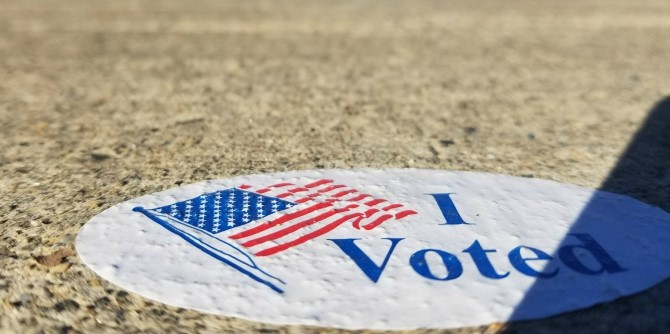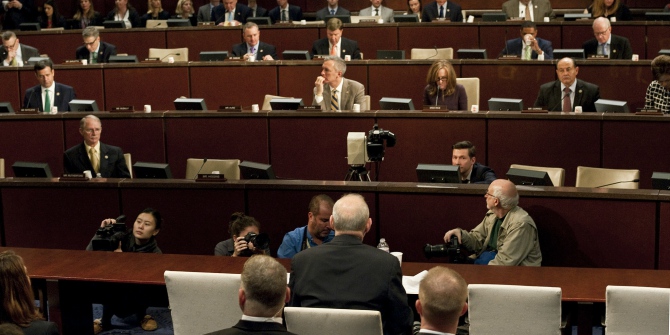 As predicted, on Saturday Joe Biden won the South Carolina Democrat primaries, capturing all 55 delegates up for grabs in the state. In this Q&A, Thomas Gift analyzes what the results mean for Biden and previews the upcoming Republican primaries in South Carolina scheduled for later this month.
As predicted, on Saturday Joe Biden won the South Carolina Democrat primaries, capturing all 55 delegates up for grabs in the state. In this Q&A, Thomas Gift analyzes what the results mean for Biden and previews the upcoming Republican primaries in South Carolina scheduled for later this month.
President Joe Biden’s victory in South Carolina was anti-climactic. So does the voting there even matter?
It’s true that Biden’s win was essentially guaranteed. But you still could argue it’s symbolically important that he took home more than 96 percent of the vote over competitors Marianne Williamson and Rep. Dean Phillips. Four years, ago, winning the Palmetto State primary gave Biden a shot in the arm when everyone thought his campaign was dead following poor showings in Iowa and New Hampshire. For the same reasons that South Carolina has been good to Biden, it did have the potential this year to expose his vulnerabilities. One concern was slippage of support among the Democrat Party’s base. Admittedly, turnout was extremely low in South Carolina on Saturday — just 24 percent of 2020 numbers. But that’s almost entirely a function of Biden not having any real competition.
Skeptics will still read Biden’s performance as reflecting a lack of enthusiasm. They’ll say that if progressives can’t be bothered to show up to a primary, they might also sit out the general election. But I think that’s an overthinking it. South Carolina confirmed that Biden faces no legitimate threat to the Democrat nomination. That’s despite most rank-and-file Democrat voters reporting they wish Biden weren’t running. At the same time, we shouldn’t forget that Robert F. Kennedy, Jr., who would have been Biden’s main primary rival, decided to bow out and run for president as an independent. If he’d stayed in the race and taken, say, 15-20 percent of the vote, experts might be framing South Carolina very differently.
What can Biden take away from his performance in South Carolina?
For Biden, perhaps the most encouraging news from South Carolina was that Black voters made up 76 percent of the early vote. That’s up significantly from 56 percent in 2020. It’s important because there’s been a lot of handwringing recently among Democrats over Biden hemorrhaging support among Black voters nationally. Polling shows that’s particularly true with young Black voters, who many experts claim are becoming a less reliable bloc for the Democrat party. In South Carolina, Biden was helped by Rep. Jim Clyburn and other prominent Black leaders touting the administration’s record on racial issues. That includes Biden appointing the first black woman justice, Ketanji Brown Jackson to the US Supreme Court, and fighting for voting rights laws that Democrats complain discriminate against minorities.

“P20230706AS-1710” by The White House is United States government work
Whether similar appeals can be successful across the country remains to be seen. To be clear, Biden will win Black voters by a landslide in the general election regardless. But if even small fraction peel off to Trump, that could pose a problem in swing states. Somewhat remarkably given how often he’s accused of using racially-charged language, a recent New York Times poll showed Trump gaining support of as much as 22 percent of the Black community. That’s despite the fact that a Republican presidential nominee hasn’t captured over 12 percent of the Black vote in almost fifty years. So, for strategists who keep their eyes on demographic trends, solid support among Black voters in South Carolina could be a positive bellwether for Biden.
The Republican Primary in South Carolina is scheduled for February 24th. What do you expect there?
The GOP is now beholden to Trump, and South Carolina is no exception. Despite the state being pivotal to Biden’s success in the primaries, Trump won South Carolina by double digits in both the 2016 and 2020 general elections. In short, it’s thoroughly his country. What’s amazing is that former Governor Nikki Haley had an 80-plus percent approval rating in South Carolina while she was governor in 2016—and she’s still likely to lose handily this month. That’s a reflection of just how popular Trump is. A recent Monmouth poll showed Trump running at 58 percent, compared to Haley at 32. The lesson is: you can’t win a Republican primary without appealing to right wing voters.
Haley’s recipe for courting moderates in New Hampshire isn’t repeatable elsewhere, and certainly not in a socially conservative state like South Carolina. So, you need to ask yourself: If Haley can’t break the MAGA wall, or even run close, in her home state, where can she compete? I think the answer is nowhere. My guess is that if she’s defeated in South Carolina, Haley’s money will dry up. If her campaign lasts beyond South Carolina, it’ll be running on fumes. Haley has burned her bridges with Trump, so perhaps she believes she has nothing to lose. At the same time, she seemingly has nothing to win. Haley appeared on Saturday Night Live last week to make fun of Trump. But it could soon be her campaign that’s the butt of jokes.
- These remarks are based in part on an interview by Thomas Gift for CNN “Newsroom” on Feb. 4, 2024.
- Please read our comments policy before commenting.
- Note: This article gives the views of the author, and not the position of USAPP – American Politics and Policy, nor the London School of Economics.
- Shortened URL for this post: https://bit.ly/49mz44F






